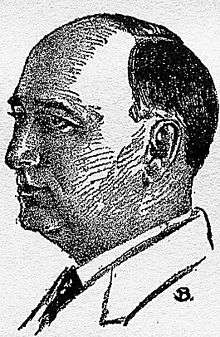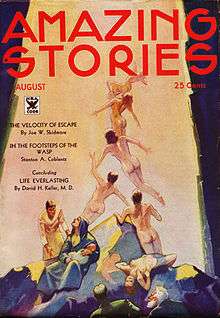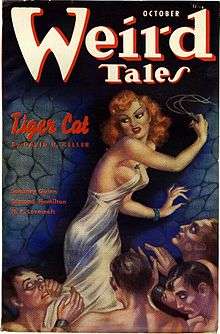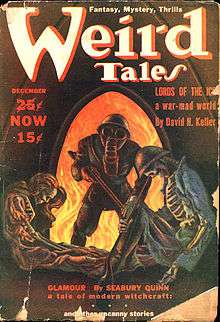David H. Keller

David Henry Keller (December 23, 1880 – July 13, 1966) was a writer for pulp magazines in the mid-twentieth century who wrote science fiction, fantasy and horror.[1] He was the first psychiatrist to write for the genre, and was most often published as David H. Keller, MD, but also known by the pseudonyms Monk Smith, Matthew Smith, Amy Worth, Henry Cecil, Cecilia Henry, and Jacobus Hubelaire.
John Clute has written, "It is clear enough that Keller's conceptual inventiveness, and his cultural gloom, are worth more attention than they have received; it is also clear that he fatally scanted the actual craft of writing, and that therefore he is likely never to be fully appreciated."[2]
Biography
Keller was born in Philadelphia and graduated from the School of Medicine at the University of Pennsylvania in 1903. He served as a neuropsychiatrist in the U.S. Army Medical Corps during World Wars I and II, and was the Assistant Superintendent of the Louisiana State Mental Hospital at Pineville until Huey Long's reforms removed him from his position in 1928.
That same year, Keller would travel to New York City to meet with Hugo Gernsback, publisher of Amazing Stories, who had bought his first professionally published science fiction story, "The Revolt of the Pedestrians". Gernsback was impressed by Keller's quality of writing, unique insight, and ability to address sophisticated themes beyond the commonplace technological predictions or lurid alien encounters typically found in early pulp stories. He encouraged Keller's writing and would later call these distinctive short stories "Keller yarns".[3]
In 1929, Gernsback founded the magazine Science Wonder Stories and not only published Keller's work in the first issue, but listed him as an Associate Science Editor. It was this issue of Science Wonder Stories that introduced the term "science fiction" to the world. This began an intense writing period for Keller, but he was unable to support his family solely on a writer's income and set up a small private psychiatric practice out of his home in Mount Pocono, Pennsylvania.
Keller became an early scholar of H.P. Lovecraft, publishing occasional works on Lovecraft from 1948 to 1965. Most notably he was the first to suggest, in 1948, the influential but erroneous idea that Lovecraft could have inherited syphilis from his parents. Lovecraft publisher Arkham House published many books in the fantasy and horror field including a small but steady number throughout the 1950s. Robert Weinberg has written that: "However, intense competition from the SF (science fiction) small presses as well as slow sales of certain titles put August Derleth in a precarious bind. Only a generous loan from Dr David H. Keller prevented Arkham from going bankrupt during a period of cash flow problems." [4][5]
Robert Weinberg writes of Keller's book career: "Dr David H. Keller had been one of the most popular science fiction authors of the 1920s and 1930s. Thus it was not surprising that several small presses, composed mainly of fans who had begun reading science fiction during that time, chose a Keller book as their first publication. Unfortunately, Dr Keller was no longer a name that could sell books and the Avalon Publishing Company, New Era Publishers and NFFF all ceased publications after producing one book by Dr Keller.[6]
Style
Keller's work often expressed strong right-wing views (Everett F. Bleiler claims he was "an ultra-conservative ideologically"[1]), especially hostility to feminists and African-Americans.[1] Keller's 1928 story "The Menace" revolves about a series of black plots to take over the United States; it has been described by Bleiler as "racially bigotted".[1][7] Keller has further been criticized for "his corrosive attitude toward both science and civilization," "anti-feminist, racist tendencies" and occasional "sexual sadism."[2]
The level of complexity found in Keller's writing rises above many other pulp stories of the same period and holds the promise of "science fiction literature" that would be fulfilled during the Golden Age of Science Fiction.
John Clute writes that Keller was "deeply involved in the last capacity in World War One and its consequences, his work focusing on shell shock; he was one of relatively few American sf writers to have anything like the direct experience of War That Will End War that marked so many British authors, a fact that may help explain his abiding cultural pessimism, often expressed in stories where a thin, almost literal veneer of civilization is peeled off to reveal the excrescence within."[2]
Keller wrote a number of horror and fantasy stories, which some critics regard as superior to his SF work.[8] Most notable is his 1932 horror tale "The Thing In The Cellar". Keller also created a series of fantasy stories called the Tales of Cornwall sequence, about the Hubelaire family; these were influenced by James Branch Cabell.[9] Keller also wrote some fantasy work inspired by his interest in Freudian psychology, including "The Golden Bough" (1934) and The Eternal Conflict (1939 in French;1949 English).[8]
Bibliography
Novels
(1929) The Conquerors
- Science Wonder Stories Dec 29 and Jan 30
(1929) The Human Termites (Clute writes that it "begins as a relatively calm-minded development of the speculative element in La Vie des termites ... by Maurice Maeterlinck ... but soon leaves behind the commonplace supposition of a termite Hive Mind, moving into an almost delirious account in which both termites and humans are seen to be governed by totalitarian central intelligences. The novel's exorbitance caused considerable stir in 1929 Fandom, but in retrospect can be understood as comprising – at least in part – a Dystopian extrapolation of the horrors of mass combat in World War One; the introduction to the 1979 book edition, by Patrick H. Adkins...is illuminating."[2])
- Science Wonder Stories Sep, Oct, Nov
(1930) The Evening Star
- Science Wonder Stories April, May
(1931) The Time Projector (w/ David Lasser)
- Wonder Stories Aug, Sep
(1932) The Metal Doom
- Amazing Stories May, June, July
- Fantastic Nov 1967, Jan 1968
(1934) Life Everlasting
- Amazing Stories July, Aug
(1940) The Devil and the Doctor. Simon & Schuster. Cover art by Gregor Duncan. Reprint: Arno Press (Supernatural and Occult Fiction), 1976, ISBN 0-405-08145-6.
(1948) The Abyss. Published in Solitary Hunters and The Abyss. New Era Publishers, cover art by John Baltadonis.
(1949) The Eternal Conflict. Prime Press.
(1949) The Homunculus. Prime Press.
(1950) The Lady Decides. Prime Press.
Short Fiction



(1928) - "The Revolt of the Pedestrians" - Amazing Stories Feb
(1928) - "White Collars" - Amazing Stories April
(1928) - "The Menace" - Amazing Stories Quarterly Summer
(1928) - "A Biological Experiment" - Amazing Stories June
(1928) - "The Psychophonic Nurse" - Amazing Stories Nov
(1928) - "Stenographer's Hands" - Amazing Stories Quarterly Fall
(1928) - "The Dogs of Salem" - Weird Tales September
(1929) - "The Yeast Men" - Amazing Stories Quarterly Summer
(1929) - "The Jelly Fish" - Weird Tales Jan
(1929) - "The Worm" - Amazing Stories Mar
(1929) - "The Damsel and Her Cat" - Weird Tales Apr
(1929) - "The Bloodless War" - Air Wonder Stories Jul
(1929) - "The Boneless Horror" - Science Wonder Stories Jul
(1929) - "The Flying Fool" - Amazing Stories Jul
(1929) - "The Feminine Metamorphosis" - (as Amy Worth) Science Wonder Stories Aug
(1929) - "The Battle of the Toads" - Weird Tales Oct
(1929) - "The Tailed Man of Cornwall" - Weird Tales Nov
(1929) - "Dragon's Blood" - Fanews
(1930) - "Air Lines" - Amazing Stories Jan
(1930) - "Creation Unforgivable" - Weird Tales April
(1930) - "The Ivy War" - Amazing Stories May
(1930) - "Boomeranging 'Round the Moon" - Amazing Stories Quarterly, Fall 1930; reprinted in Science Fiction Classics, Winter 1967, ed. Ralph Adris (Magazine Productions)[10]
(1931) - "The Cerebral Library" - Amazing Stories May
o(1931) - "Free as Air" - Amazing Stories June
(1931) - "The Rat Racket" - Amazing Stories Nov
(1932) - "The Pent House" - Amazing Stories Feb
(1932) - "The Thing in the Cellar" - Weird Tales March
(1932) - "The Hidden Monster" - Oriental Stories Summer
(1932) - "No More Tomorrows" - Amazing Stories Dec
(1933) - "A Piece of Linoleum" - (as Amy Worth) 10 Story Book Dec
(1934) - "The Lost Language" - Amazing Stories Jan
(1934) - "The Dead Woman" - Fantasy Magazine April
(1934) - "The Literary Corkscrew" - Wonder Stories March
(1934) - "Binding Deluxe" - Marvel Tales May
(1934) - "The Doorbell" - Wonder Stories June
(1934) - "The Golden Bough" - Marvel Tales Win
(1935) - "The Living Machine" - Wonder Stories May
(1938) - "Dust in the House" - Weird Tales July
(1938) - "The Thirty and One" - Marvel Science Stories Nov
(1939) - "The Moon Artist" - Cosmic Tales Summer
(1941) - "The Goddess of Zion" - Weird Tales Jan
(1941) - "The Red Death" - Cosmic Stories July
(1942) - "The Bridle" - Weird Tales Sept
(1947) - "Heredity" - The Vortex #2
(1947) - "The Face in the Mirror" in Life Everlasting and Other Tales of Science, Fantasy and Horror (The Avalon Company). Reprinted in: Life Everlasting and Other Tales of Science, Fantasy and Horror (1974), in Hyperion Press's Classics of Science Fiction series, ISBN 0-88355-140-3. Also reprinted in: Keller Memento (2010) by Ramble House, ISBN 978-1-60543-528-2.[11]
(1948) - "Helen of Troy Loki"
(1948) - "The Perfumed Garden" - The Gorgon v2 #4
(1949) - "The Door" - The Arkham Sampler Summer
(1951) - "Chasm of Monsters" - Also published in The Folsom Flint and Other Curious Tales (1969) by Arkham House, and Keller Memento (November, 2010) by Ramble House, ISBN 978-1-60543-528-2.[12]
(1952) - "The Folsom Flint" - Also published in The Folsom Flint and Other Curious Tales (1969) by Arkham House, and in Keller Memento (2010) by Ramble House, ISBN 978-1-60543-528-2.[13]
(1952) - "Fingers in the Sky" - Also published in The Folsom Flint and Other Curious Tales (1969) by Arkham House, and in Keller Memento (2010) by Ramble House, ISBN 978-1-60543-528-2.[14]
(1952) - "The God Wheel" - Tales from Underwood, Arkham House and Pellegrini & Cudahy.[15]
(1952) - "The Opium Eater" - Tales from Underwood, Arkham House and Pellegrini & Cudahy.[16]
(1953) - "The Golden Key" - Destiny Spring. Also published in The Folsom Flint and Other Curious Tales (1969) by Arkham House, and in Keller Memento (2010) by Ramble House, ISBN 978-1-60543-528-2.[17]
(1953) - "The Question" - Fantastic Worlds Fall
(1962) - "In Memoriam" - Dark Mind, Dark Heart, ed. August Derleth, (Arkham House)[18]
(1969) - "The Landslide" - The Folsom Flint and Other Curious Tales, Arkham House.[19]
(1980) - "The House Without Mirrors" - Weird Tales #1, (Dec 1980), ed. Lin Carter, publ. Zebra Books / Kensington Publishing Corp., ISBN 0-89083-714-7.[20]
Early Works
1895 "Aunt Martha" (as Monk Smith) in Bath Weekly
1897 "A Phenomenon of the Stars" - The Mirror Feb
1899 "Judge Not" - in The Red and Blue (University of Pennsylvania) Nov
1900 "The Silent One" - in The Red and Blue Nov
1901 "A University Story" - (as Henry Cecil), in Presbyterian Journal (University of Pennsylvania) Dec
1902 "The Birth of a Soul" - (as Henry Cecil), in The White Owl Jan
1902 "A Three Linked Tail" - (as Matthew Smith), in The White Owl March
1902 "The Winning Bride" - (as Henry Cecil), in The White Owl March
1902 "The Great American Pie House" - (as Cecilia Henry), in The White Owl April
1902 "Mother Newhouse" - (as Henry Cecil), in The White Owl May
1902 "The Greatness of Duval" - in Ursinus Weekly Oct
Poetry
1899 "The Night" - The Red and Blue (University of Pennsylvania) Nov
1902 "Undo Everlasting" - The White Owl March
1902 "L'Envoi" - The White Owl March
1902 "A Melody" - The White Owl March
1902 "A Mother's Song" - The White Owl May
1948 "Modern Science" - in: Kotan September, 1948, Vol. 1, No. 1. editor Gordon Mack.
Nonfiction
(1928) The Sexual Education Series, Roman Publishing Company, New York:
1. Sex and Family Through the Ages
2. The Sexual Education of a Young Man
3. The Sexual Education of the Young Woman
4. Love, Courtship, Marriage
5. Companionate Marriage, Birth Control, Divorce, and Modern Home Life
6. Mother and Baby
7. Sexual Diseases and Abnormalities of Adult Life
8. The Sexual Life of Men and Women After Forty
9. Diseases and Problems of Old Age
10. Sex and Society
(1933) "Types of Science Fiction" in Science Fiction Digest, March 1933, ed. Maurice Z. Ingher.
(1940) "The Psychology of Fear" in The Thing in the Cellar, publ. The Bizarre Series #2.[21]
(1941) "The Med-Lee: News Digest of the 9th Medical Battalion" :12 Nov, 19 Nov, 26 Nov, 10 Dec
(1947) "Dr. David H. Keller on His Half a Century of Writing" in The Last Magician: Nine Stories from Weird Tales (Apr 1978), P.D.A. Enterprises (The David H. Keller Memorial Library #1).
(1948) "What Price Beauty?" in The Fanscient, #3 Spring 1948, ed. Donald B. Day. The Portland Science Fiction Society.
(1948) "Author, Author: David H. Keller, M.D." in The Fanscient, #5 Fall 1948, ed. Donald B. Day. The Portland Science Fiction Society.
(1949) "Book Reviewing" in The Fanscient, #7 Spring 1949, ed. Donald B. Day. The Portland Science Fiction Society.
(1949) "Stories and Life" in The Fanscient, #9 Fall 1949, ed. Donald B. Day. The Portland Science Fiction Society.
(1950) "Longevity" in Operation Fantast, #5 June 1950, ed. Ken Slater.
(1958) "Shadows over Lovecraft" in Howard Phillips Lovecraft Memorial Symposium, Steve Eisner. University of Detroit. Published in Fresco, Spring 1958, v. 8, no. 3, a quarterly magazine published by the University of Detroit. Other contributors included August Derleth and Fritz Leiber.
(1985) "Titus Groan: An Appreciation" in Exploring Fantasy Worlds: Essays on Fantastic Literature, ed. Darrell Schweitzer. Borgo Press. (I.O. Evans Studies in the Philosophy and Criticism of Literature #3), ISBN 0-89370-162-9. This is probably the same review that appeared in Operation Fantast, #4, March 1950.
Critical response
John Clute describes Keller's early work: "The stories of Keller's early prime – with their heavily foregrounded concepts and Inventions and with their endemic indifference to plausible narrative follow-through – made him an ideal writer for Hugo Gernsback, who published most of his output during these years, as well as his first book, The Thought Projector (1929 chap), in the Science Fiction Series of pamphlets."
Examining a particularly famous story, Clute writes, "'The Revolt of the Pedestrians' may be the most remarkable of these, though certainly one of the strangest. It is one of the relatively few sf tales before around 1970 to treat the hypertrophy of automobile culture in the twentieth century as Dystopian; after centuries, 'automobilists' have become almost organically tied to their Pollution-emitting cars, have lost the use of their legs, and have made pedestrianism a fatal offense. After the leader of a band of pedestrians turns off all electricity, legless automobilists die helplessly in their millions; the description of the death of twenty million New Yorkers attempting to flee Manhattan is extremely vivid. In the end, two elite pedestrians meet and prepare to breed, far from any despicable City."[2]
Bleiler described Keller as "a very poor technician" when it came to writing fiction. However, he also argued that Keller "occasionally wrote fable-like stories, detached from daily realities and surrogate science fiction realities, that were excellent".[1] Bleiler also described "The Revolt of the Pedestrians" as "a powerful story, horrible at times, but imaginative and rigorous in logic".[1] Despite being ignored in the US outside science-fiction and fantasy fandom, several French writers, including Régis Messac, praised Keller as a "major author".[1]
See also
References
- 1 2 3 4 5 6 7 E.F. Bleiler and Richard Bleiler Science Fiction: The Gernsback Years. Kent, OH: Kent State University Press, 1998. ISBN 9780585239828 (pp. 210-227)
- 1 2 3 4 5 Clute, John (July 19, 2013). "Keller, David H, M D". The Encyclopedia of Science Fiction. Retrieved August 4, 2013.
- ↑ Brian Stableford, "David H. Keller", in Bleiler, E. F., ed. Science Fiction Writers. New York: Scribners, 1982 (pgs. 119-123).
- ↑ Robert Weinberg, "Science Fiction Specialty Publishers" in Hall, Hal W. (ed). Science Fiction Collections: Fantasy, Supernatural and Weird Tales. Haworth Press, 1983, p. 126
- ↑ Sam Moskowitz, "I Remember Derleth", Starship (Winter 1981), pp. 10-11
- ↑ Robert Weinberg, "Science Fiction Specialty Publishers" in Hall, Hal W. (ed). Science Fiction Collections: Fantasy, Supernatural and Weird Tales. Haworth Press, 1983, p. 123
- ↑ Sam Moskowitz, "Rocket to Green Pastures" in Strange Horizons : the spectrum of science fiction, New York : Scribner, 1976. ISBN 9780684147741
- 1 2 Brian Stableford. "Keller, David H." in The A to Z of Fantasy Literature. Lanham, Md. Scarecrow Press, 2005. ISBN 9780810863453. (pg. 231)
- ↑ Keller, David H(Enry) in The Encyclopedia of Fantasy (1997), p. 533.
- ↑ Von Ruff, Al. "Bibliography: Boomeranging 'Round the Moon". Internet Speculative Fiction Database. Retrieved August 4, 2013.
- ↑ Von Ruff, Al. "Bibliography: The Face in the Mirror". Internet Speculative Fiction Database. Retrieved August 4, 2013.
- ↑ Von Ruff, Al. "Bibliography: Chasm of Monsters". Internet Speculative Fiction Database. Retrieved August 4, 2013.
- ↑ Von Ruff, Al. "Bibliography: The Folsom Flint". Internet Speculative Fiction Database. Retrieved August 4, 2013.
- ↑ Von Ruff, Al. "Bibliography: Fingers in the Sky". Internet Speculative Fiction Database. Retrieved August 4, 2013.
- ↑ Von Ruff, Al. "Bibliography: The God Wheel". Internet Speculative Fiction Database. Retrieved August 4, 2013.
- ↑ Von Ruff, Al. "Bibliography: The Opium Eater". Internet Speculative Fiction Database. Retrieved August 4, 2013.
- ↑ Von Ruff, Al. "Bibliography: The Golden Key". Internet Speculative Fiction Database. Retrieved August 4, 2013.
- ↑ Von Ruff, Al. "Bibliography: In Memoriam". Internet Speculative Fiction Database. Retrieved August 4, 2013.
- ↑ Von Ruff, Al. "Bibliography: The Landslide". Internet Speculative Fiction Database. Retrieved August 4, 2013.
- ↑ Von Ruff, Al. "Bibliography: The House Without Mirrors". Internet Speculative Fiction Database. Retrieved August 4, 2013.
- ↑ Von Ruff, Al. "Bibliography: The Psychology of Fear". Internet Speculative Fiction Database. Retrieved August 4, 2013.
External links
| Wikisource has original works written by or about: David H. Keller |
- Bibliowiki has original media or text related to this article: David Henry Keller (in the public domain in Canada)
- David H. Keller as Pulp Author
- David H. Keller at the Internet Speculative Fiction Database
- Works by David H. Keller at Project Gutenberg
- Works by or about David H. Keller at Internet Archive
- David H. Keller Papers at Syracuse University
- David H. Keller short stories, MSS 389 at L. Tom Perry Special Collections, Brigham Young University